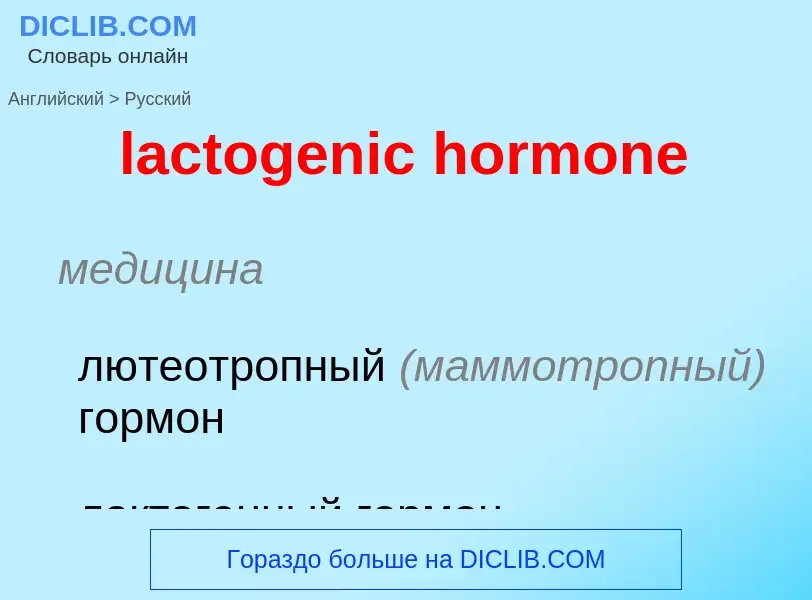Übersetzung und Analyse von Wörtern durch künstliche Intelligenz ChatGPT
Auf dieser Seite erhalten Sie eine detaillierte Analyse eines Wortes oder einer Phrase mithilfe der besten heute verfügbaren Technologie der künstlichen Intelligenz:
- wie das Wort verwendet wird
- Häufigkeit der Nutzung
- es wird häufiger in mündlicher oder schriftlicher Rede verwendet
- Wortübersetzungsoptionen
- Anwendungsbeispiele (mehrere Phrasen mit Übersetzung)
- Etymologie
lactogenic hormone - Übersetzung nach russisch
медицина
лютеотропный (маммотропный) гормон
лактогенный гормон
[prəu'læktin]
медицина
лютеотропный (маммотропный) гормон
лактогенный гормон
лактотропин
маммотропин
пролактин
существительное
биохимия
пролактин
медицина
лютеотропный (маммотропный) гормон
лактогенный гормон
лактотропин
маммотропин
пролактин
Definition
Wikipedia

Prolactin (PRL), also known as lactotropin, is a protein best known for its role in enabling mammals to produce milk. It is influential in over 300 separate processes in various vertebrates, including humans. Prolactin is secreted from the pituitary gland in response to eating, mating, estrogen treatment, ovulation and nursing. It is secreted heavily in pulses in between these events. Prolactin plays an essential role in metabolism, regulation of the immune system and pancreatic development.
Discovered in non-human animals around 1930 by Oscar Riddle and confirmed in humans in 1970 by Henry Friesen, prolactin is a peptide hormone, encoded by the PRL gene.
In mammals, prolactin is associated with milk production; in fish it is thought to be related to the control of water and salt balance. Prolactin also acts in a cytokine-like manner and as an important regulator of the immune system. It has important cell cycle-related functions as a growth-, differentiating- and anti-apoptotic factor. As a growth factor, binding to cytokine-like receptors, it influences hematopoiesis and angiogenesis and is involved in the regulation of blood clotting through several pathways. The hormone acts in endocrine, autocrine, and paracrine manners through the prolactin receptor and numerous cytokine receptors.
Pituitary prolactin secretion is regulated by endocrine neurons in the hypothalamus. The most important of these are the neurosecretory tuberoinfundibulum (TIDA) neurons of the arcuate nucleus that secrete dopamine (a.k.a. Prolactin Inhibitory Hormone) to act on the D2 receptors of lactotrophs, causing inhibition of prolactin secretion. Thyrotropin-releasing hormone has a stimulatory effect on prolactin release, although prolactin is the only anterior pituitary hormone whose principal control is inhibitory.
Several variants and forms are known per species. Many fish have variants prolactin A and prolactin B. Most vertebrates, including humans, also have the closely related somatolactin. In humans, three smaller (4, 16, and 23 kDa) and several larger (so-called big and big-big) variants exist.


